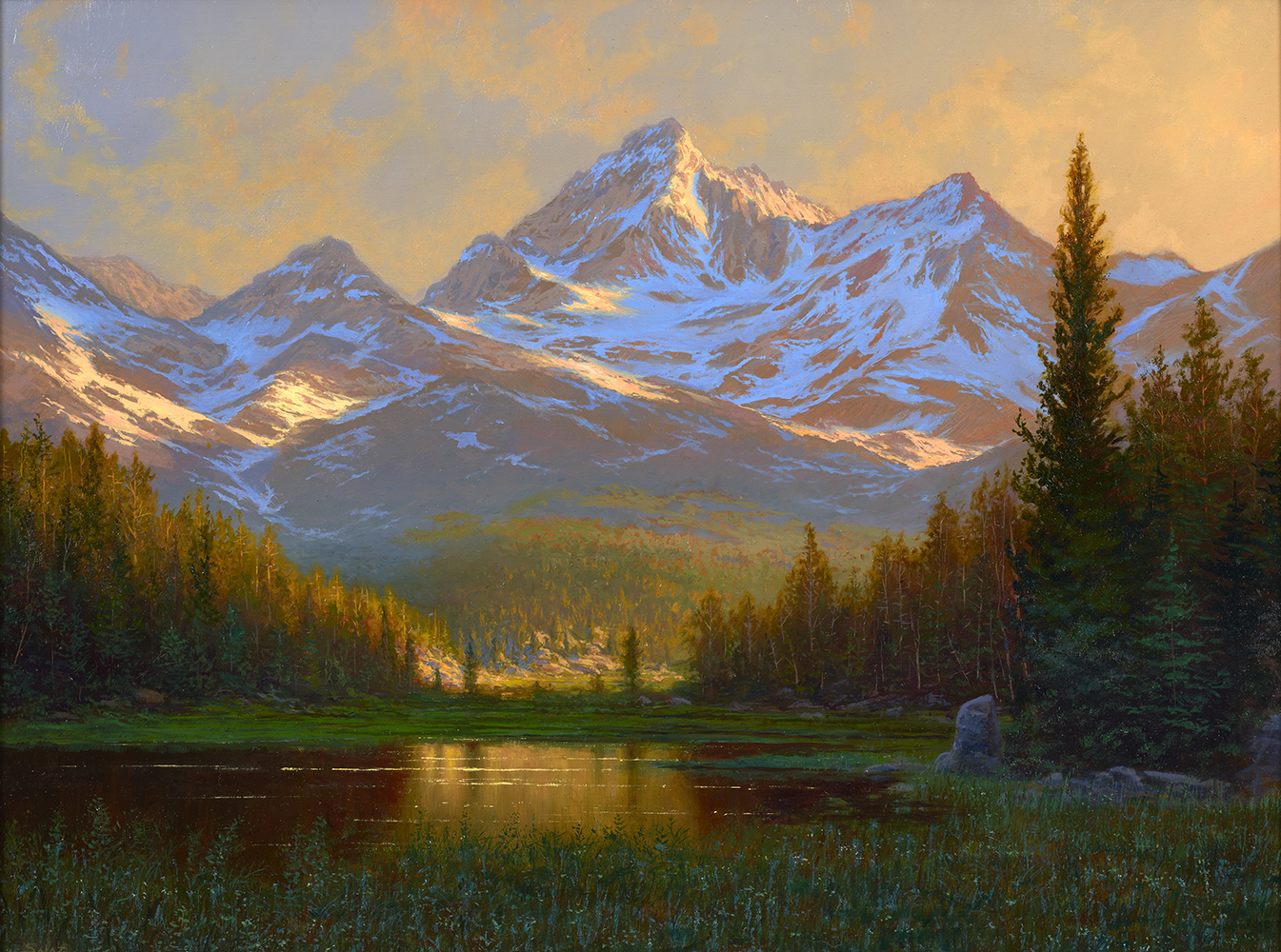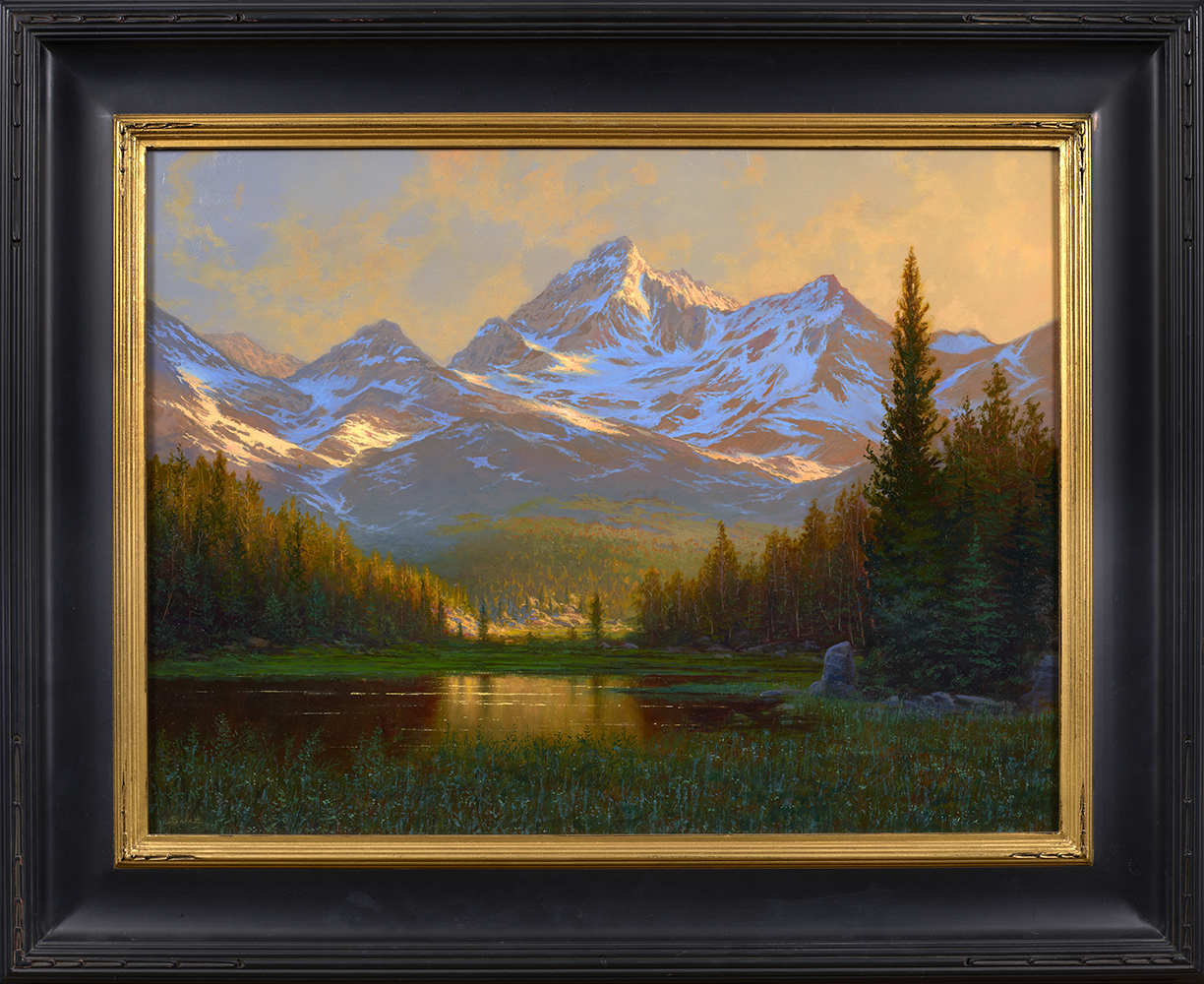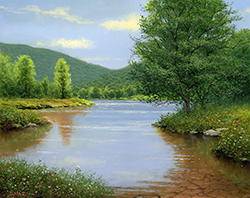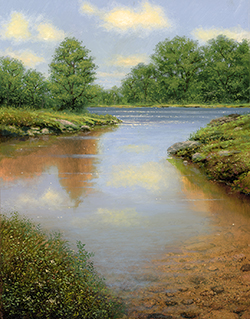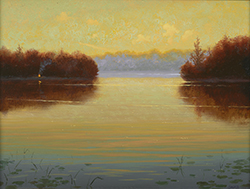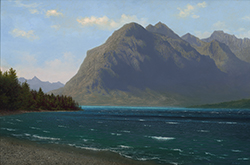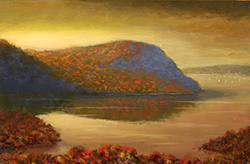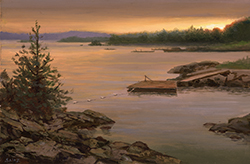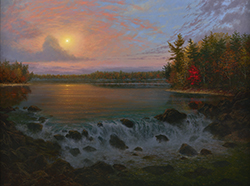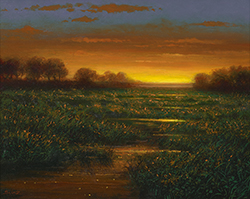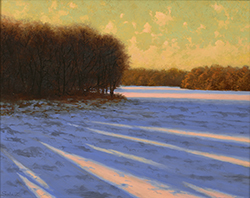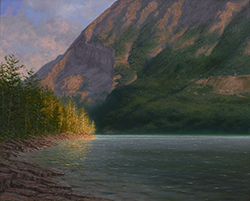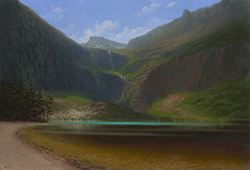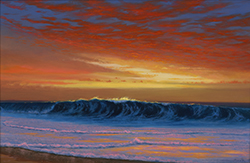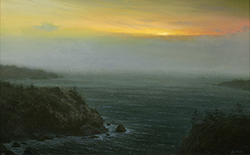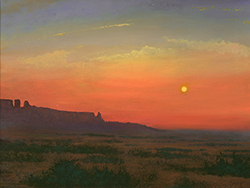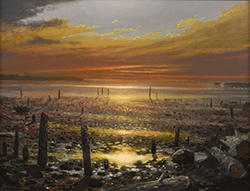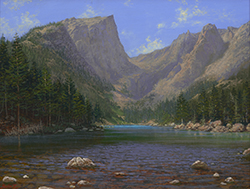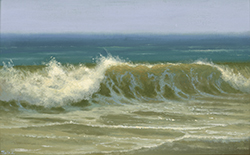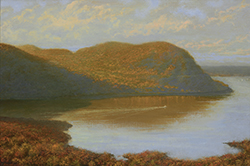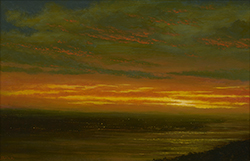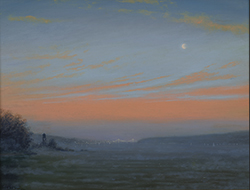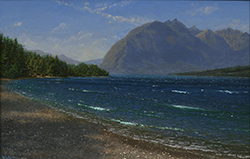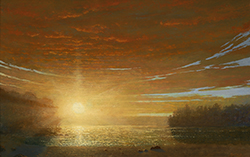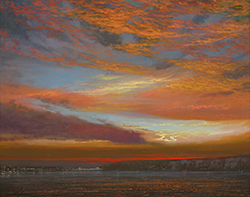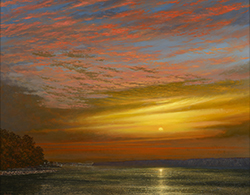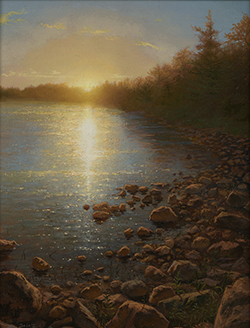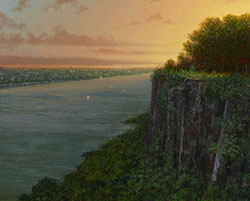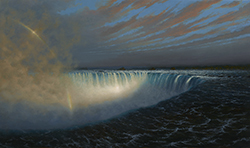Ken Salaz
(Born 1970)
Marsh Lake
Oil on canvas
18 x 24 inches
Signed
BIOGRAPHY - Ken Salaz (Born 1970)
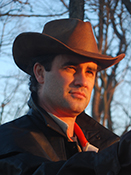
'Like Painting A Speeding Bullet,' Landscape Master Ken Salaz Depicts Tactile Feeling Of Nature, Sun
Forbes article by Natasha Gural
Although he was born in Bakersville, California, Ken Salaz spent the first five years of his life near Guadalajara, Mexico. The four Salaz children not only grew up bilingual, but also with an uncommonly broad perspective on the world. Returning to the US in 1975, the family briefly moved to Phoenix and then to Tucson where Salaz’s paternal grandmother lived. This early exposure to his father’s and grandmother’s Yacqui culture would prove to be a significant influence in Salaz’s painting; the landscape of Arizona has likewise remained a touchstone.
The family moved again in 1977 to Huntington, West Virginia, and it was there that the seven-year-old Salaz first realized that he wanted to become an artist. A case of the flu and an earache had kept him home from school, and being bored, he started to add muscles on his figure drawings. As he worked on his project, he felt a sense of recognition that art was his particular strength; and resolved that he would become a “serious artist”. When his father gave him a drafting table for his eighth birthday, he proclaimed that he would become “better than Picasso” and produced a watercolor of a bird in flight to prove his point.
Salaz’s parents were supportive of their son’s interest in art—and in magic which also fascinated him—throughout his school years. The public schools in Huntington offered standard art classes, but young Salaz was interested in exploring non-formulaic possibilities, especially those that would yield a sense of astonishment, wonder and beauty. For him, this was one of the connections between performing magic and painting, and he was rapidly developing both of these skills.
He graduated from high school in 1988 and left West Virginia with a scholarship to study art at Carnegie Mellon in Pittsburgh. He stayed only a year before moving on to Cooper Union in New York city where he received a Bachelor of Fine Arts degree in 1992. During his summer breaks from Cooper Union, he had begun to travel the world, and after graduation, he spent three years traveling, performing magic and learning everything he could about the magical arts. From Asia to Central and South America, he absorbed esoteric knowledge from “shamans, gypsies, psychics, pickpockets and thieves.” [i] In Europe, he also spent hours in museums, copying the master painters of the western tradition; as he remarks, it provided him with his “real education in painting.” Not surprisingly, he was also drawing and painting all the regions of the world that he visited.
When he returned to New York city in 1993, he began to sell some of his paintings, almost exclusively figurative work at the time, to a small group of collectors; some of those individuals still remain patrons. As a young artist, however, Salaz was also working at a variety of jobs, including cabinet making, bartending, and performing magic. Gradually, his work as a magician became his primary source of income, and for the next decade, Salaz traveled extensively, building both his reputation and skill as a magician—and painting when he could. The balance between magic and art has always been at the heart of Salaz’s career.
By 2008, Salaz was a well-established magician with an increasingly impressive client list. He performed on The Tonight Show Starring Jimmy Fallon to rave reviews resulting in a notable boost in his bookings. A year earlier he had met his future wife Camie, who is also a painter, and by 2008, his career as a artist reached a significant turning point when he received a Hudson River Fellowship from Jacob Collins’ Water Street Atelier.
Collins established the Water Street Atelier in the 1990s as a classical art school; in 2007, he created the Hudson River Fellowship with the goal of building “a new movement of American art, modeling itself after the artistic, social and spiritual values of the Hudson River School painters. It will bring together the reawakening enthusiasm for the old American painters, the vigorous but unfocused scene of contemporary landscape painting and the urgent need for a renewed reverence for the land. By bringing back the skills and spirit of the pre-impressionist landscape painters the program will give much needed direction to a new generation of painters.” [ii]
For Salaz, one of the earliest recipients of the fellowship, this opportunity to spend nearly a month focusing exclusively on landscape painting triggered another moment of recognition. As he explains it, “The fellowship solidified the direction I wanted to go. It brought together the language of classical painting and the wild reverent spiritual relationship to nature and the sun.” The two cultural streams of Salaz’s life and experience were united: the western classical art he had been studying for years merged with the Yacqui traditions of his father’s family that were grounded in nature.
In 2009 he received a second Hudson River Fellowship and embarked on an arduous study of Greek philosophy and transcendentalism. Plato’s concept of ideal beauty as a reflection of the temporal beauty of the world finds an American expression in the work of Ralph Waldo Emerson, Henry David Thoreau, and Walt Whitman. For the transcendentalists and their counterparts in the visual arts, the wild landscapes of New England could also be transformed into Platonic embodiments of ideal beauty and harmony. For Salaz, a raw plein air sketch reveals the underlying ideals of natural beauty in the form of a finished painting that emphasizes the humility of human beings in the presence of nature.
Not surprisingly, Salaz and his wife left New York city to settle in the Hudson River Valley where their son was born in 2010. Painting became increasingly central to Salaz’s life, and after an unsuccessful venture with some television producers, he shifted the balance between magic and art. Increasingly, he began to reserve blocks of time for painting in the Catskills and traveling to the coasts of Oregon and Washington as well as making yearly visits to Arizona. In 2008, he received a Marchutz Scholarship to study in Aix-en-Provence in southern France, and he has continued to spend extended periods of time there.
Salaz is still a working magician, but his time is now devoted primarily to work in the studio, teaching and being a father. He is also a senior fellow at the Hudson River Fellowship where he teaches other fellowship recipients every summer. The painters of the Hudson River School, particularly Frederick Edwin Church, have become a sustained influence on his work as has the painting of Ivan Shishkin, one of the Russian landscape artists associated with the independent group known as The Wanderers. [iii]
Exhibitions and awards have been abundant since Salaz turned his attention to landscape painting. In addition to participating in numerous juried exhibitions, he was a finalist at the Art Renewal Center Salon in 2013; and he received the Grand Prize at the Cranford, New Jersey Plein Air Competition that same year. In 2014, he was awarded an Honorable Mention at the Art Renewal Center’s International Salon.
Looking at the future, Salaz voices an interest in exploring the possibility of incorporating figures into his landscapes. Combining these two genres would allow him to integrate his love of both figure painting and landscapes. Teaching is likely to be an important part of the future as well, and a new book on classical landscape techniques and philosophy is scheduled for publication in 2018. Although Salaz describes the last decade as a whirlwind, he seems to have emerged from it having fully embraced that sense of recognition that characterized that seven-year-old boy determined to be a “serious artist”.
Janet Whitmore, Ph.D.
[i] See Salaz’s website, Astonishmentinc.com
[ii] See http://www.jacobcollinspaintings.com/teaching.html
[iii] In Russia, this nineteenth century group was called Peredvishniki. They broke from the Imperial Academy of Arts in St. Petersburg in 1863 to form a cooperative artists society that would emphasize images of daily life and bring art to the people throughout the Russian empire.
| AVAILABLE WORKS | ||||||||||||||||||||||||||||

